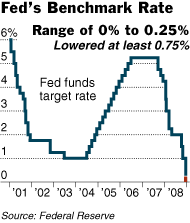from "Saving our Economy" - continued
--------------------------------------------------------
At that same hearing, ranking member of the House Financial Services Committee Barney Frank (D-MA) defended his practices with regard to Fannie Mae and Freddie Mac: "Fannie Mae and Freddie Mac, are not in a crisis."
Frank said the Fed Govt should be encouraging F&F to do more to get low-income families into homes:
"The more people, in my judgment, exaggerate a threat of safety and soundness, the more people conjure up a possibility of serious financial losses to the treasury - which I do not see, I think we see entities which are fundamentally sound financially and can withstand some of the disaster scenarios - the more pressure there is there, then the less I think we see in terms of 'affordable housing' ".
The top executives at F&F began cooking their books, exaggerating their sales in their quarterly reports, so that the company officials could claim they had met their companies' sales targets, and thus collect huge salary bonuses. They were finally caught in 2004. Several of them stepped down, but none was every punished, or even charged. One of them, Franklin Raines, CEO of Fannie Mae, later gave financial and housing advice to the campaign of Presidential contender Barack Obama.
At a House Financial Services Committee Hearing on Feb. 17, 2005, Alan Greenspan warned against one of the fundamental ideas of modern liberalism, the idea of putting all our eggs in one basket by concentrating financial activity into just a few big agencies in central government: "... Enabling these institutions to increase in size - and they will once the crisis in their judgment passes - we are placing the total financial system of the future at a substantial risk."
He later added at another hearing on on April 6, 2005: "If we fail to strengthen GSE regulation, we increase the possibility of insolvency and crisis."
Senator Charles Schumer (D-NY) ignored any possibility the F&F might be in trouble at that hearing, and simply pointed to the advantages some people had gotten from the government's activities: "I think Fannie and Freddie ... are an intrinsic part of making America the best-housed people in the world... if you look over the last 20 or whatever years, they have done a very, very good job."
Schumer also complained, "Things are good in the housing market. Why are people entertaining radical change?"
On April 7, 2005, Treasury Secretary John Snow warned again: "These large portfolios, unchecked in their growth over the last decade or so, pose a real problem." The Senate Banking Committee adopted strong regulation that would have prevented Fannie and Freddie from acquiring these bad mortgages. All of the Republicans on the committee voted for it, and all the Democrats voted against it, and it passed out of the committee on a straight party-line vote. But Democrats then filibustered the bill on the Senate floor, preventing it from being brought to a vote.
Freddie Mac and Fannie Mae was active in making campaign contributions to politicians, from money that ostensibly was for low-income mortgages. The top two recipients were:
Christopher Dodd (D-CT): $165,000
Barack Obama (D-IL): $126,000
The highest-receiving Republican was Bob Bennett (R-UT), who got $108,000. Further down the list was John McCain (R-AZ), who accepted $25,000.
On May 25, 2006 in the Senate, John McCain (R-AZ) sounded more warnings over the huge size and lack of discipline in the government companies, and sponsored a bill to regulate the companies more firmly: "For years I have been concerned about the regulatory structure that governs Fannie Mae and Freddie Mac... and the sheer magnitude of these companies and the role they play in the housing market... the GSEs need to be reformed without delay." McCain's bill was voted out of committee on a straight party-line vote: All Republicans voted for it, and all Democrats voted against. Democrats then announced they would filibuster the bill in the Senate, as they had the previous year's regulatory legislation. Republicans knew they did not have enough votes to achieve the 60% needed, and so never brought the bill to the Senate floor.
By the beginning of 2008, Fannie Mae and Freddie Mac had bought up over $4 trillion in mortgages, roughly one-quarter of which was risky sub-prime mortgage paper. With interest rates rising, these rickety homeowners started defaulting on their loans. Only about 2% of them defaulted by January 2008, but the effect was disastrous. Banks began to get leery of lending money to each other, knowing that their fellow banks held substantial assets that might default and become worthless, thus making the banks unable to pay back their loans to each other.
Banks and lending institutions began collapsing or seeking emergency help: Countrywide Financial, Lehman Brothers, insurer AIG, Bear Stearns, IndyMac bank, etc. buckled to their knees as paralysis spread. The huge numbers of risky subprime mortgages, had become like a "poison pill" that choked the institutions that had swallowed them. The Fed finally took over Freddie Mac and Fannie Mae, but the damage had long been done.
Congress appropriated nearly $1 trillion in emergency funds to loan to, or otherwise prop up, failing financial institutions. But none of the original legislation that had spurred decades of risky lending, has been repealed in all the "bailout" frenzy, and there are no bills pending to do so.
-------------------------------------------------------
Anything else I can help you with?



